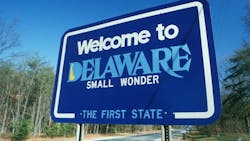Domestic Tax Haven, Delaware, Under Pressure
WASHINGTON -- There are more companies than people in the small state of Delaware. The reason is clear: the state offers companies low taxes, an efficient, pro-business legal environment, and it allows anyone to set up a company anonymously, registering a shell that hides who really controls it and controls the money within it.
That has now put Delaware, and other states that permit shell companies, in the sights of the U.S. authorities, after they have campaigned against international tax havens like Switzerland to fight tax dodging and money laundering.
Around two-thirds of the 500 largest U.S. companies, including Coca-Cola, Google and Walmart, are registered in the state, even as they operate from distant headquarters.
All they need in Delaware is a small mailbox, and they can enjoy the sweetheart environment it offers businesses.
And Delaware benefits substantially: the business of hosting businesses brought it $880 million in fees and taxes in 2013, 23% of the state budget.
But that same environment works for criminals as well. For just a few minutes and a few hundred dollars, anyone can register a company in the state without divulging the beneficial owner's name. As in offshore tax havens, the state protects that secrecy.
"Most states require more documentation to get a library card or a driver' license" than Delaware does to set up a company, John Kowalko, a state politician, said.
Most companies "take advantage of the system to do good, but some have ulterior motives."
Delaware shell companies are hiding places for all kinds of miscreants. Viktor Bout, the infamous Russian arms dealer known as the "merchant of death", established a number of Delaware-registered companies to mask his activities, as did the notorious Washington lobbyist Jack Abramoff, jailed for six years in 2006 for corruption.
One group of shell companies was set up to bilk millions of dollars from Medicare.
"Anonymous companies are what unite all financial crime that generates money through corruption, tax evasion or drug trafficking, or to scam vulnerable people," said Stefanie Osteld of Global Witness, the anti-corruption group.
John Cassara, a former investigator for the U.S. Treasury, said authorities chasing down dirty money often run into an impenetrable wall in Delaware. He recalled being asked by foreign governments to follow money trails. But "there was nothing we could as soon as U.S. based shell-companies were involved," he said.
"We didn't even take the pain to make requests because we knew it was a waste of time."
Pressure on Shell Companies
After cracking down on tax havens abroad, U.S. authorities are taking aim at shell companies. The Obama administration raised the issue in its 2015 budget, and members of Congress have regularly submitted laws to fight shell companies.
"The United States is currently one of the world's biggest offenders in terms of creating corporations with hidden owners," Senator Carl Levin said last year.
The newest proposal has earned the support of 31 Delaware state legislators who, in a joint letter, argued that law enforcement officials need to be "sufficiently equipped" to investigate cases.
"We don't ask them to divulge commercial secrets, a patent," said Kowalko. "We're asking them to say who are the people that own these companies."
The group called for a federal standard for registering companies so that one state does not gain advantage on others with less stringent requirements.
The U.S. business community has stayed quiet on the subject, leaving Delaware's leaders to defend its reputation and the revenues they gain from company registration fees.
"Everybody wants to be supportive of helping law enforcement to be able to investigate and prosecute financial crimes. But the real debate is how we can reach this goal," Delaware chief deputy secretary of state Richard Geisenberger said.
Geisenberger said the solution needs to be found at the federal level, stressing that simply registering companies is not the problem. He said the problem is with financial institutions which handle money.
"The simple act of forming a legal entity doesn't involve moving money. The better way to capture money laundering is actually to require the people who are moving those dollars to know who they're doing business with."
-Jeremy Tordjman, AFP
Copyright Agence France-Presse, 2014
About the Author
Agence France-Presse
Copyright Agence France-Presse, 2002-2025. AFP text, photos, graphics and logos shall not be reproduced, published, broadcast, rewritten for broadcast or publication or redistributed directly or indirectly in any medium. AFP shall not be held liable for any delays, inaccuracies, errors or omissions in any AFP content, or for any actions taken in consequence.
